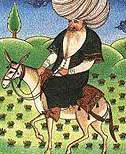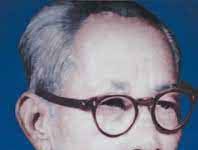Al-Shanfara | Life and Poetic Career
Al-Shanfara | Life and Poetic Career
Al-Shanfara | Life and Poetic Career
Brief Life Sketch: Al-Shanfara was a famous pre-Islamic bandit poet. The term ‘bandit poet’ refers to those poets of the pre-Islamic period who were expelled from their tribe unjustly or for some crime and lived a nomadic life with freedom. These poets wandered in the desert and made a living by robbing or intimidating people. Some of them made money by composing and reciting poems. Al-Shanfara was one such poet.
Al-Shawanfarai was born into the famous Azod tribe in the southern Arab province of Yemen. His real name was Amr bin Rabiah bin Al Awas bin Al Hujar bin Al Azod. Many scholars have speculated that Shanfara was his nickname. The word ‘Shannara’ means ‘huge-lipped’. People used to call him ‘Shanfara’, probably because his lips were bigger than normal. His father’s name was Al-Rabia. His mother was an Abyssinian slave. She was the daughter of Fahim bin Kayesh. He inherited courage and strength from his father’s lineage and got black skin from his mother’s side. His father was a poor man who earned his living by hard work and sometimes by looting people. Shanfara did not get any chance to earn an education as he was brought up in the midst of adversity.
It is said that when he was a child, someone killed his father. After the loss of his father, he moved with his mother to his maternal uncle’s house. But there, he was accidentally taken prisoner by a man of the Shababa tribe and demanded two hundred camels as ransom. The family of Shanfara could not pay the ransom and then he was handed over to the people of the Salma tribe. From then on he began to live in the house of a man belonging to the Salma tribe. Once he caught a fever. He then called in the daughter of his foster father and asked him to pour water on his head. But the girl became very angry and insulted him. Shanfara then wanted to know her true identity from his foster father because he was unaware of his family identity. When he came to know about his ancestral identity he became furious and promised to kill a hundred people of the Salma tribe in retaliation for the injustice done to him.
After this, he somehow managed to escape from the Salma tribe and fled to a nomadic life.
During this time he befriended some ruthless young men and killed ninety-nine people of the Salma tribe. However, as the 100th man was about to be killed, the Salma tribesmen suddenly attacked and killed Shanfara in 510 AD and left his dead body in the sand of the desert.
A long time after the death of Shanfara, a man of the Salma tribe was going along the desert and found the skeleton of Shanfara on the way and kicked it with his feet. Unfortunately, a bone of his skull got into the man’s leg and the man later died of that injury. In this way, the promise of Shanfara to kill 100 people of the Salma tribe was fulfilled.
Shanfara, a victim of social injustice and oppression, lived a miserable life with a vengeful mentality.
Poetic Career: Al-Shanfara, was probably the poet of many poems, although most of them have been lost and those which were later preserved in various collections indicate that he possessed extraordinary poetic talent. Most of his poems were composed in protest of social injustice.
Among the poems written by him the poem entitled ‘Lamiyatul Arab’ is a famous one. This poem is a narrative poem. In the poem, he describes his bandit life, love affair, personal well and woe, violence, revenge, desert lifestyle, etc. The following quoted lines from his poem show that he suffered a lot from his relatives:
“O people of my mother’s family
Wake up from sleep and know
You have disrespected me a lot
I’ll leave you now and go a long way
You know the reason for my leaving
It is as bright as the moonlit night. ”
His love poems were romantic. But there is no obscene description of the female body in his poems. He tried to mark the woman as a symbol of good ideals.
The language of his poetry was eloquent and lecture-type, the rhythm was eloquent and the emotion was like an unobstructed river, the imagery was simple but captivating.
It is worth mentioning that among the poets of the pre-Islamic era, Shanfara was a uniquely appealing poet who proudly expressed his awareness of social injustice by giving a realistic poetic form to his own hard experience. 0 0 0.
Read More: A Brief History of Arabic Literature: Early Islamic Period (622 AD-661 AD)
N.B. This article ‘Al-Shanfara | Life and Poetic Career’ originally belongs to the book entitled ‘A Brief History of Arabic Literature: Pre-Islamic Period (500 AD-622 AD) by Menonim Menonimus. Al-Shanfara | Life and Poetic Career
Related Searches:
- Al-Shanfara
- Al-Shanfara-Campus
- Abid bin Al-Abras
- Labid ibn Rabiyah
- Imru al- Qays
- Arabic Language
- A Very Brief History of Arabic Language
Books of Literary Criticism by M. Menonimus:
- World Short Story Criticism
- World Poetry Criticism
- World Drama Criticism
- World Novel Criticism
- World Essay Criticism
- Indian English Poetry Criticism
- Indian English Poets and Poetry Chief Features
- Emily Dickinson’s Poetry-A Thematic Study
- Walt Whitman’s Poetry-A Thematic Study
- Critical Essays on English Poetry
- Tawfiq al-Hakim’s Novel: Return of the Spirit-An Analytical Study
- Tawfiq al-Hakim’s Novel: ‘Yawmiyyat Naib Fil Arayaf’-An Analytical Study
- Analytical Studies of Some Arabic Short Stories
- A Brief History of Arabic Literature: Pre-Islamic Period (500 AD-622 AD)
- A Brief History of Arabic Literature: Early Islamic Period (622 AD-661 AD)











